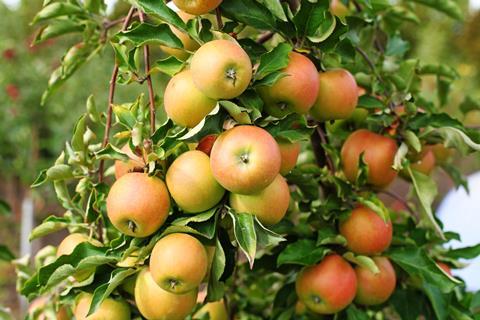A lack of apples on the global market is good news for Belgian producers this campaign, as they continue to contend with a multitude of other challenges
The coming apple campaign in Belgium looks promising, according to Marc Evrard of Belgian Fruit Valley. “Contrary to last season, we will be entering an empty market with no stocks left from the Northern Hemisphere and less Southern Hemisphere fruit due to issues in New Zealand for instance,” he says. “In Belgium we are expecting a slightly later start to the season of around 10-14 days. So we should be beginning from a strong position, and that’s true of both the generic and the managed varieties.”

Belgian apples experienced a strong finish to the last campaign, according to Tony Derwael of Bel’Export, having begun with a record European harvest of 12m tonnes. “We processed high volumes,” he says, “and high demand for concentrates in the US and Asia used up all the stocks in July.”
High costs, of labour, energy, fertiliser and packaging materials, continue to be a major challenge. “The overall cost for a grower to produce one kilogram of produce has risen substantially over the last season,” says Evrard. “This is in addition to all the climate issues we have to face, including droughts, floods, cold, heat and frost, as well as making sure you’re in line with Green Deal regulations on things like packaging. It makes growers apprehensive about how to deal with everything because there are a lot of uncertainties. Education is necessary at all levels. We need to educate the clients, the retailers and also the end-consumers.”
Labour availability and cost remain a challenge, but the gap between wages in different European countries has at least come down. “We saw in the past that there was a huge gap between labour costs in southern and eastern Europe and those in, for instance, Belgium,” says Evrard. “Now the gap is much smaller. Before the labour cost was €5-6 per hour in southern Europe, and around €12 in Belgium. Now it’s about €15 in Belgium and closer to €12 in southern Europe.”
For Evrard, good workers will always be an important investment. “If you want good quality labour, you have to understand that the cost of living is rising for everyone, including for workers and they need to make a decent living.” he says.
Equally important is to continue to develop growing markets like India. This season, according to Evrard, much will depend on the volumes coming in to the country from other sources.
“It remains to be seen what other origins have to offer,” he says. “We know that over the last few years, China has been out due to some specific issues between the two countries. Indian buyers have been more focused on Iran and Turkey for price-related issues. There are still European suppliers sending to the Indian market, from Poland, Italy, Belgium and others. India and the US are looking to work more closely together, so there’s going to be a renewed focus on US apples like Red Delicious. Import tariffs, which had been put up from 50 per cent to 75 per cent, are now going to be lowered again to 50 per cent, which will definitely give more of a competitive edge to US apples.”



